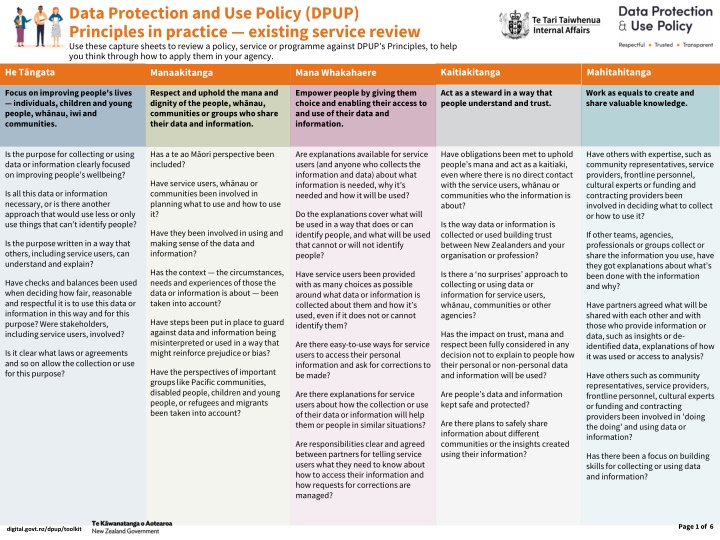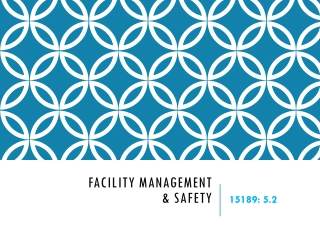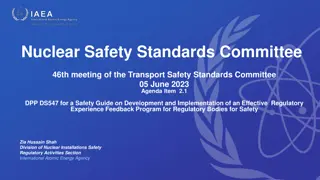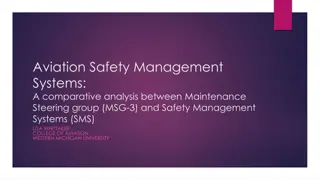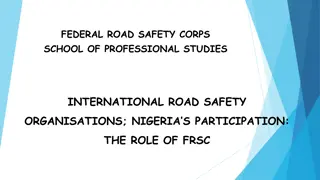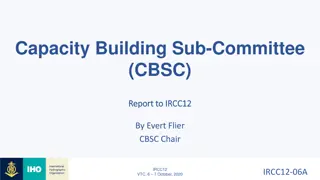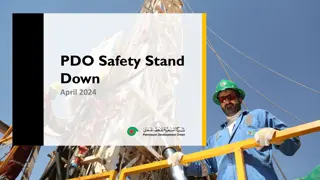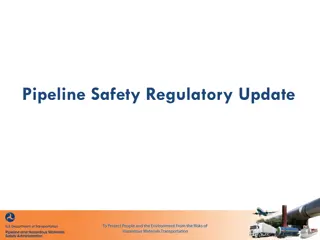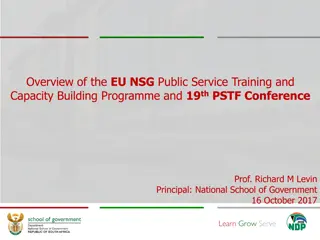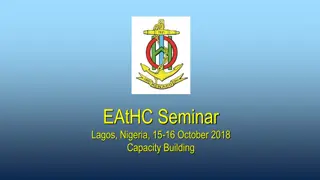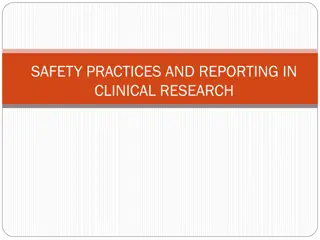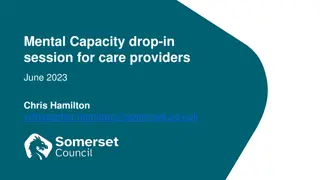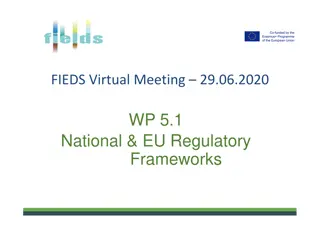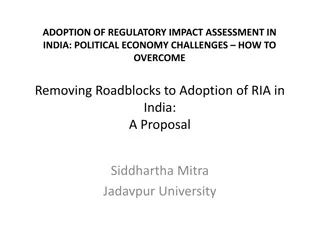Regulatory Capacity Building and Knowledge Management in Safety Organizations
A regulatory body plays a crucial role in promoting effective safety management in organizations by ensuring self-assessment, correction, and maintaining safety responsibilities. Regulatory capacity depends on various factors like authority, infrastructure, goals, leadership, and enforcement. In India, regulatory bodies are empowered by national laws governing nuclear and radiological facilities. The scope and authority of regulatory bodies should be clearly defined to avoid confusion.
Download Presentation

Please find below an Image/Link to download the presentation.
The content on the website is provided AS IS for your information and personal use only. It may not be sold, licensed, or shared on other websites without obtaining consent from the author.If you encounter any issues during the download, it is possible that the publisher has removed the file from their server.
You are allowed to download the files provided on this website for personal or commercial use, subject to the condition that they are used lawfully. All files are the property of their respective owners.
The content on the website is provided AS IS for your information and personal use only. It may not be sold, licensed, or shared on other websites without obtaining consent from the author.
E N D
Presentation Transcript
Data Protection and Use Policy (DPUP) Principles in practice existing service review Use these capture sheets to review a policy, service or programme against DPUP s Principles, to help you think through how to apply them in your agency. He T ngata Kaitiakitanga Mahitahitanga Manaakitanga Mana Whakahaere Act as a steward in a way that people understand and trust. Focus on improving people's lives individuals, children and young people, wh nau, iwi and communities. Respect and uphold the mana and dignity of the people, wh nau, communities or groups who share their data and information. Empower people by giving them choice and enabling their access to and use of their data and information. Work as equals to create and share valuable knowledge. Is the purpose for collecting or using data or information clearly focused on improving people s wellbeing? Has a te ao M ori perspective been included? Are explanations available for service users (and anyone who collects the information and data) about what information is needed, why it s needed and how it will be used? Have obligations been met to uphold people s mana and act as a kaitiaki, even where there is no direct contact with the service users, wh nau or communities who the information is about? Have others with expertise, such as community representatives, service providers, frontline personnel, cultural experts or funding and contracting providers been involved in deciding what to collect or how to use it? Have service users, wh nau or communities been involved in planning what to use and how to use it? Is all this data or information necessary, or is there another approach that would use less or only use things that can t identify people? Do the explanations cover what will be used in a way that does or can identify people, and what will be used that cannot or will not identify people? Is the way data or information is collected or used building trust between New Zealanders and your organisation or profession? Have they been involved in using and making sense of the data and information? If other teams, agencies, professionals or groups collect or share the information you use, have they got explanations about what s been done with the information and why? Is the purpose written in a way that others, including service users, can understand and explain? Has the context the circumstances, needs and experiences of those the data or information is about been taken into account? Have service users been provided with as many choices as possible around what data or information is collected about them and how it s used, even if it does not or cannot identify them? Is there a no surprises approach to collecting or using data or information for service users, wh nau, communities or other agencies? Have checks and balances been used when deciding how fair, reasonable and respectful it is to use this data or information in this way and for this purpose? Were stakeholders, including service users, involved? Have partners agreed what will be shared with each other and with those who provide information or data, such as insights or de- identified data, explanations of how it was used or access to analysis? Have steps been put in place to guard against data and information being misinterpreted or used in a way that might reinforce prejudice or bias? Has the impact on trust, mana and respect been fully considered in any decision not to explain to people how their personal or non-personal data and information will be used? Are there easy-to-use ways for service users to access their personal information and ask for corrections to be made? Is it clear what laws or agreements and so on allow the collection or use for this purpose? Have the perspectives of important groups like Pacific communities, disabled people, children and young people, or refugees and migrants been taken into account? Have others such as community representatives, service providers, frontline personnel, cultural experts or funding and contracting providers been involved in 'doing the doing' and using data or information? Are there explanations for service users about how the collection or use of their data or information will help them or people in similar situations? Are people s data and information kept safe and protected? Are there plans to safely share information about different communities or the insights created using their information? Are responsibilities clear and agreed between partners for telling service users what they need to know about how to access their information and how requests for corrections are managed? Has there been a focus on building skills for collecting or using data and information? Page 1 of 6 digital.govt.nz/dpup/toolkit
DPUP Principles in practice existing service review He T ngata Author: Date: / / Review notes: Focus on improving people's lives individuals, children and young people, wh nau, iwi and communities. 1. Is the purpose for collecting or using data or information clearly focused on improving people s wellbeing? 2. Is all this data or information necessary, or is there another approach that would use less or only use things that can t identify people? 3. Is the purpose written in a way that others, including service users, can understand and explain? Actions required: 4. Have checks and balances been used when deciding how fair, reasonable and respectful it is to use this data or information in this way and for this purpose? Were stakeholders, including service users, involved? 5. Is it clear what laws or agreements and so on allow the collection or use for this purpose? Page 2 of 6 digital.govt.nz/dpup/toolkit
DPUP Principles in practice existing service review Manaakitanga Author: Date: / / Review notes: Respect and uphold the mana and dignity of the people, wh nau, communities or groups who share their data and information. 1. Has a te ao M ori perspective been included? 2. Have service users, wh nau or communities been involved in planning what to use and how to use it? 3. Have they been involved in using and making sense of the data and information? 4. Has the context the circumstances, needs and experiences of those the data or information is about been taken into account? Actions required: 5. Have steps been put in place to guard against data and information being misinterpreted or used in a way that might reinforce prejudice or bias? 6. Have the perspectives of important groups like Pacific communities, disabled people, children and young people, or refugees and migrants been taken into account? Page 3 of 6 digital.govt.nz/dpup/toolkit
DPUP Principles in practice existing service review Mana Whakahaere Author: Date: / / Review notes: Empower people by giving them choice and enabling their access to and use of their data and information. 1. Are explanations available for service users (and anyone who collects the information and data) about what information is needed, why it s needed and how it will be used? 2. Do the explanations cover what will be used in a way that does or can identify people, and what will be used that cannot or will not identify people? 3. Have service users been provided with as many choices as possible around what data or information is collected about them and how it s used, even if it does not or cannot identify them? Actions required: 4. Are there easy-to-use ways for service users to access their personal information and ask for corrections to be made? 5. Are there explanations for service users about how the collection or use of their data or information will help them or people in similar situations? 6. Are responsibilities clear and agreed between partners for telling service users what they need to know about how to access their information and how requests for corrections are managed? Page 4 of 6 digital.govt.nz/dpup/toolkit
DPUP Principles in practice existing service review Kaitiakitanga Author: Date: / / Review notes: Act as a steward in a way that people understand and trust. 1. Have obligations been met to uphold people s mana and act as a Kaitiaki, even where there is no direct contact with the service users, wh nau or communities who the information is about? 2. Is the way data or information is collected or used building trust between New Zealanders and your organisation or profession? 3. Is there a no surprises approach to collecting or using data or information, for services users, wh nau, communities or other agencies? Actions required: 4. Has the impact on trust, mana and respect been fully considered in any decision not to explain to people how their personal or non-personal data and information will be used? 5. Is data and information kept safe and protected? 6. Are there plans to safely share information about different communities back with them, or the insights created using their information? Page 5 of 6 digital.govt.nz/dpup/toolkit
DPUP Principles on a page existing service review Mahitahitanga Author: Date: / / Review notes: Work as equals to create and share valuable knowledge. 1. Have others with expertise, such as community representatives, service providers, frontline personnel, cultural experts or funding and contracting providers been involved in deciding what to collect or how to use it? 2. If other teams, agencies, professionals or groups collect or share the information you use, have they got explanations about what s been done with the information and why? 3. Have partners agreed what will be shared with each other and with those who provide information or data, such as insights or de-identified data, explanations of how it was used or access to analysis? Actions required: 4. Have others such as community representatives, service providers, frontline personnel, cultural experts or funding and contracting providers been involved in 'doing the doing' and using data or information? 5. Has there been a focus on building skills for collecting or using data and information? Page 6 of 6 digital.govt.nz/dpup/toolkit
